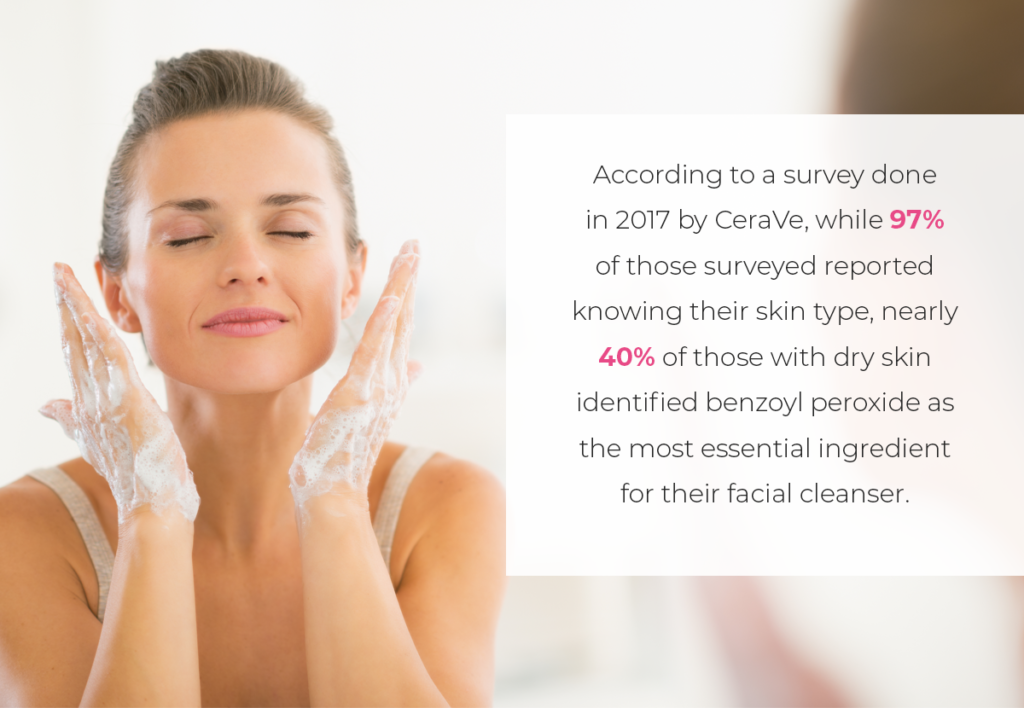What Should You Be Using In Your Skin Care Routine?
Take my quiz and get personalized recommendations from a
licensed esthetician!
How to Find the Difference Between Sensitive Versus Sensitized Skin
If your skin type confuses you, you’re not alone!

Ummm, yikes!
This study highlights the fact that there’s still confusion about what skin type really means. In my practice, I see the following issues often:
- People haven’t identified their true skin type, and sometimes confuse skin type with skin condition.
- People do know their skin type but don’t know what changes to make in their skincare behavior as a result.
One common mistake I see occurs when people don’t recognize the difference between sensitive skin, which is a skin type, and sensitized skin, which is not.
There really is a difference.
And not understanding that difference can be a skincare disaster.
In this post, my goal is to help you connect the dots between your skin type and your skincare.
I’ll also make sure that you recognize sensitive vs. sensitized skin and treat it accordingly using practices that will soothe and heal.
Let’s get started!

What Is Sensitive Skin?
Skin sensitivity is a huge issue for many.
According to The International Society of Dermatology, 44.6% of Americans claim to have sensitive to extremely sensitive skin.
The reality is this: Truly sensitive skin is genetic.
It’s what you’re born with.
This means the way it reacts to sunlight, the way it reacts to chemicals and products, and, once you have the knowledge you need, how you should take care of it.
Those who were born with sensitive skin share certain characteristics – their skin reacts easily to outside influences like the weather, fragrances, heat, or cold.
When exposed, sensitive skin becomes inflamed and irritated easily and often.
As I mentioned, one of the biggest factors that causes you to have sensitive skin is your DNA.
While you can’t exactly change your skin type if you have sensitive skin, you can cultivate certain self-care behaviors and skincare habits that will work with your natural skin type rather than against it.
No matter the skin type you were born with, you can nourish your skin and treat it well, and it will look and feel its best in return.
Some practices, like staying hydrated with plenty of water, are essential to every skin type.
Other practices, like choosing the right ingredients for a rejuvenating mask, should differ depending on your skin type.
How to Know Your True Skin Type
Lucky for us, beauties, gone are the days of the “all-purpose” night creams found in every medicine cabinet.
Now we have options!
The key with so many choices is to find the exact formulas that will benefit your unique skin and serve its needs the best.
To do that, you must know your skin type.

What Is Sensitized Skin?
Sensitized skin is not something you were born with.
Though the effects are similar to sensitive skin, sensitized skin is not caused by our DNA, but by our lifestyle and the choices we make, such as the environments where we spend the most time or the products we apply to our skin.
In my experience, some of the biggest factors causing sensitized skin are pollution, stress, and alcohol consumption.
In this day and age, as much as we may enjoy a cocktail hour, the fast pace of city life, and the adrenaline rush of the daily hustle, it’s all taking its toll and creating irritable skin for many.
Some of these factors are easier to change than others.
Let’s look at two of the biggest and least understood culprits when it comes to creating sensitized skin, and then we’ll break down the best practices and products for both sensitive and sensitized skin.
Pollution
Air pollutants, those tiny toxic particles that float around in the air in rad places like NY and LA, are unfortunately easily absorbed by the skin.
Pollution comes from the cars we drive, the factories that produce the goods we rely on, and the fossil fuels we burn.
The effects of pollution on the skin are two-fold:
- First, they infiltrate into the deepest layers of skin and where they cause water loss and reduce elasticity.
- Second, they result in more free radicals, which interfere with your skin’s barrier protection function among other things.
With all that happening, it’s clear how the constant exposure to air pollution can easily lead to sensitized skin.
Properly cleansing and protecting, and also applying antioxidant-rich serums and moisturizers that counteract the damage, are all key when dealing with pollution.

Alcoholic Beverages
I hate to be the bearer of bad news, but when it comes to alcohol consumption, the news for skincare is not good.
Here are some of the effects that regular consumption has on the skin:
- Dehydrates
- Enlarges pores
- Causes dullness and loss of elasticity
- Creates wrinkles
Basically, alcohol increases inflammation, and inflammation is no friend to your skin.
Like pollution, alcohol makes it harder for your skin to protect itself.
It increases the presence of free radicals and reduces water content and vital compounds like vitamins A and C.
You can see why alcohol plays a role in sensitizing skin.
Staying hydrated, as well as applying nourishing moisture replenishers that contain Vitamin C, are key to counteracting its effects.

Other Skin Sensitizers
A few other common culprits to mention.
First, allergies to certain ingredients are more common than many people realize, and skin allergies are a growing problem.
According to the World Health Organization, atopic eczema, which is a form of allergy, has increased in prevalence worldwide.
A Mayo Clinic patch test study of skincare ingredients published in 2010 provided data that suggests that an estimated 1 in 4 of the general population are allergic to preservatives, and 1 in 7 are allergic to fragrance.
If you suspect an allergy is sensitizing your skin, the best thing to do is stop using products with anything but the fewest and simplest ingredients and look for improvement.
Then, reintroduce products using patch testing and pay close attention to changes in your skin.
This approach takes patience, but identifying the problem substance, which will be causing long-term damage to your skin over time, is well worth it.
Second, severe weather conditions tend to wreak havoc on our skin.
As temperatures get increasingly hot in the warmer months, our skin has to work harder to keep cool and calm, leading to an inflammatory response.
Extreme cold and windy climates have the same effect.
With summer upon us, beauties, now is the time to start feeding your skin with the nutrients and moisturizing ingredients it will need to stay soothed and protected.
Third, skin conditions like eczema, psoriasis, and rosacea can be the underlying cause of what we mistakenly think of as sensitive skin.
While genetics likely play a role in all of these conditions, keeping the immune system strong and reducing exposure to common allergens (practicing clean skincare) can really help reduce flare-ups.

What Is the Acid Mantle?
Speaking of the immune system, now’s a great time to mention the acid mantle, or skin barrier.
Science’s name for the skin barrier is the epidermal permeability barrier.
When the skin, which is the outermost organ of the body, is exposed to all those elements and conditions we’ve discussed above, its protective barrier is compromised.
The interrupting of this thin barrier layer from doing its naturally-intended job is not a symptom of skin disorders and diseases but is very often the cause.
The resilient layer of your skin which contains the acid mantle, the stratum corneum, is responsible for the skin’s most important function: protecting the body.
It does all this by regulating the movement of water, electrolytes, and other substances into and out of the skin.
The film on top of the stratum corneum, known as the acid mantle, is made of natural oils and sweat.
But it also consists of some pretty critical proteins and molecules that the skin uses for defense, like UV-absorbers, inflammatory mediators, and antimicrobial peptides.
The acidification of this outermost protective film is critical for it to do its job (which explains the name acid mantle).
As you can see, protecting the acid mantle should be one of our most important jobs in skincare.

How Do We Protect the Acid Mantle?
The acid mantle is slightly acidic and needs to stay that way to keep out harmful contaminants, which are generally alkaline.
The skin’s pH should ideally stay at around 4.7.
Using alkaline products for cleansing that change that ideal pH is one of the most common ways that we compromise the acid mantle and lower our skin’s defenses.
The best way to restore the acid mantle?
Use cleansing products that are pH balanced.
And any time you treat the skin with an acidic product, apply a serum or lotion that will then neutralize that acidity and bring the skin’s pH back to normal.
That said, let’s dive into the ideal skin care treatment for both sensitive skin and sensitized skin.
How to Treat Sensitive Skin
Remember, skin type is mostly genetic.
Recognizing your skin type and then acting accordingly is half the battle.
Do not apply irritating products and ingredients to sensitive skin.
The first strategy for treating the sensitive skin type is to choose a product line with a SHORT list of ingredients.
- Look for allergy-friendly ingredients.
These are usually soothing to the skin and won’t disrupt the acid mantle.
- Choose cleansers that are pH balanced.
You won't have to worry if your cleanser is stripping your skin's natural oils!
- Choose ingredients that prevent moisture loss and are anti-inflammatory.
They will calm and soothe the skin while keeping it hydrated at all times.
Here are a few that I highly recommend:
And the final strategy for sensitive skin:
- Patch test before applying a new product or ingredient to your face.
Apply the product or ingredient to a small patch of skin on the inside of your arm.
Wait 24-48 hours and check for any reaction.
If you don’t see a reaction, you’re good to go!
How to Treat Sensitized Skin
Remember that sensitized skin is not a skin type but is a reaction to your lifestyle and choices.
The good news is, you can control much of the problem.
The bad news is, you may need to change some habits.
The best way to treat sensitized skin is from the inside out.
Here are my recommendations:

- Eat skin-friendly foods that provide the nutrients your skin craves.
Veggies like avocados, cucumbers, and broccoli boost your skin’s defenses.
Proteins like beef and eggs, fatty fish, and oysters provide omega-3 fatty acids.
And fruits like papaya, kiwi, and oranges provide critical vitamins and beta-carotene.
- Avoid skin-damaging foods.
The biggest culprits are those containing alcohol, sugar, and too much salt.
Avoid processed and fried foods as much as possible.
- Stay hydrated.
Drink at least 8 glasses of water a day and snack on foods with a high water content, like celery, cucumbers, apples, grapes, and watermelon.
By nourishing your skin with a clean, nutrient-rich diet, avoiding the consumption of damaging substances, and staying hydrated, you’ll be doing your best to help your skin do its job.
And as always, be sure to protect yourself from harmful UV rays.
If you do all that, you can skip the gimmicky substances that promise perfect skin, and watch your sensitized skin become calm and much happier.
Product Recommendations
If you're experiencing sensitive or sensitized skin, here are some products that can be of help!
Alana Mitchell Daily OC Cream Cleanser
June Jacobs Pore Purifying Toner
Dermaquest Delicate Soothing Serum
Neocutis Neo Cleanse Gentle Skin Cleanser 125ml
Alana Mitchell Daily Vitamin C Moisturizer
Final Thoughts
The skin is such an important organ, lovelies.
We must treat it accordingly.
Protecting the acid mantle will help keep the skin safe so it can do its job.
One of the best ways to protect sensitive skin is to choose nourishing, hydrating, and soothing ingredients.
The best way to calm sensitized skin is to make cleaner lifestyle choices that will reduce inflammation and irritation.
Inflammation is the enemy, and staying hydrated is a great counter-attack, no matter what skin type you have.
If you are like so many of us in today’s world who are dealing with sensitized skin, tell us in the comments one lifestyle change you intend to make. And, which soothing ingredient do you already know your skin loves?
Top Brands
New Brands

Recent Posts

Are You Taking the Right Steps to Care for Your Skin?
Take the Quiz
Skincare Secrets!
10-step guide for healthy, beautiful skin after kids.
100% privacy. I will never spam you!


















